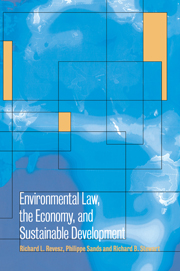 Environmental Law, the Economy and Sustainable Development
Environmental Law, the Economy and Sustainable Development Book contents
- Frontmatter
- Contents
- List of contributors
- Introduction: environmental regulation in multi-jurisdictional regimes
- PART I ENVIRONMENTAL REGULATION IN FEDERAL SYSTEMS
- PART II ENVIRONMENTAL REGULATION AND INTERNATIONAL TRADE
- PART III CHOICE OF ENVIRONMENTAL POLICY INSTRUMENTS
- PART IV THE ENVIRONMENTAL STANDARD - SETTING PROCESS
- PART V INTERNATIONAL ENVIRONMENTAL LAW AND SUSTAINABLE DEVELOPMENT
- 12 Environmental protection in the twenty-first century: sustainable development and international law
- 13 Markets and sustainability
- Index
12 - Environmental protection in the twenty-first century: sustainable development and international law
Published online by Cambridge University Press: 03 May 2010
- Frontmatter
- Contents
- List of contributors
- Introduction: environmental regulation in multi-jurisdictional regimes
- PART I ENVIRONMENTAL REGULATION IN FEDERAL SYSTEMS
- PART II ENVIRONMENTAL REGULATION AND INTERNATIONAL TRADE
- PART III CHOICE OF ENVIRONMENTAL POLICY INSTRUMENTS
- PART IV THE ENVIRONMENTAL STANDARD - SETTING PROCESS
- PART V INTERNATIONAL ENVIRONMENTAL LAW AND SUSTAINABLE DEVELOPMENT
- 12 Environmental protection in the twenty-first century: sustainable development and international law
- 13 Markets and sustainability
- Index
Summary
This chapter addresses some of the key issues facing the international community as it seeks further to develop and apply rules of international law for the protection of the environment. A decade or so ago a paper on this topic would probably have begun with a discussion as to whether the subject of international environmental law even existed: there were no treatises or journals specifically on the subject, only a very limited number of law school courses were being taught, and most treatises on general international law made no mention of the environment (with little risk of being criticized for incompleteness).
Today the situation is very different, as the environment comes to occupy a more central position in the international legal order. Within the past couple of years the International Court of Justice has confirmed the “obligations of States to respect and protect the natural environment” and expressed the opinion that their “general obligation…to ensure that activities within their jurisdiction or control respect the environment of other States or of areas beyond national control is now part of the corpus of international law relating to the environment.” This latter obligation, it is now clear, is applicable at all times and to all activities.
These are expressions of a general obligation. They will have to be further elaborated in the context of particular objectives and cases. In this regard, account will have to be taken of the international community's expressed commitment, at the 1992 UN Conference on Environment and Development (“UNCED”), to treat environment and development in an integrated manner and to cooperate “in the further development of international law in the field of sustainable development.”
- Type
- Chapter
- Information
- Environmental Law, the Economy and Sustainable DevelopmentThe United States, the European Union and the International Community, pp. 369 - 409Publisher: Cambridge University PressPrint publication year: 2000
- 4
- Cited by
